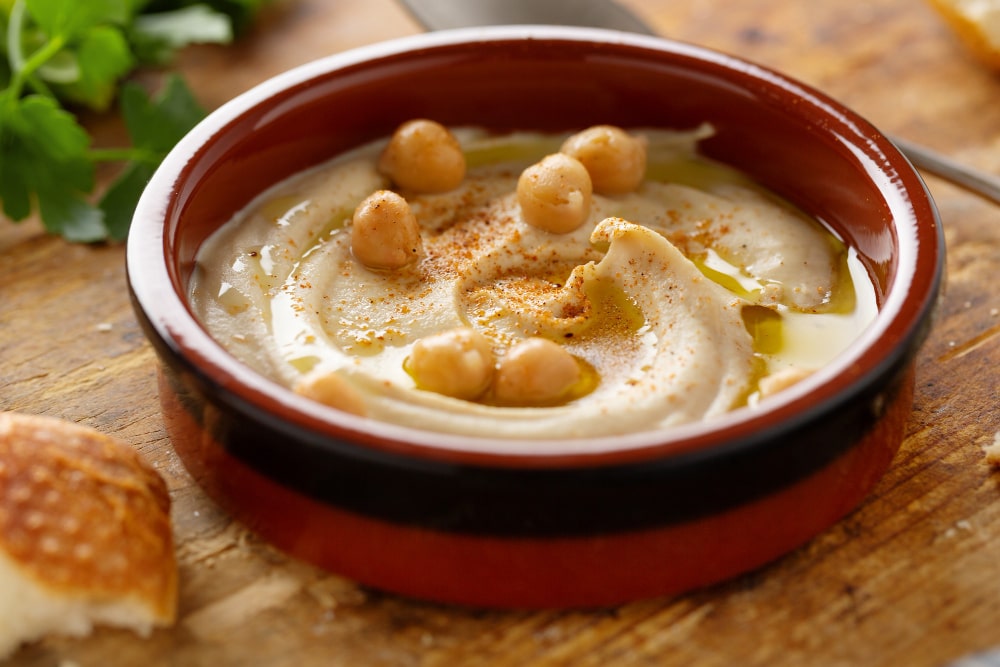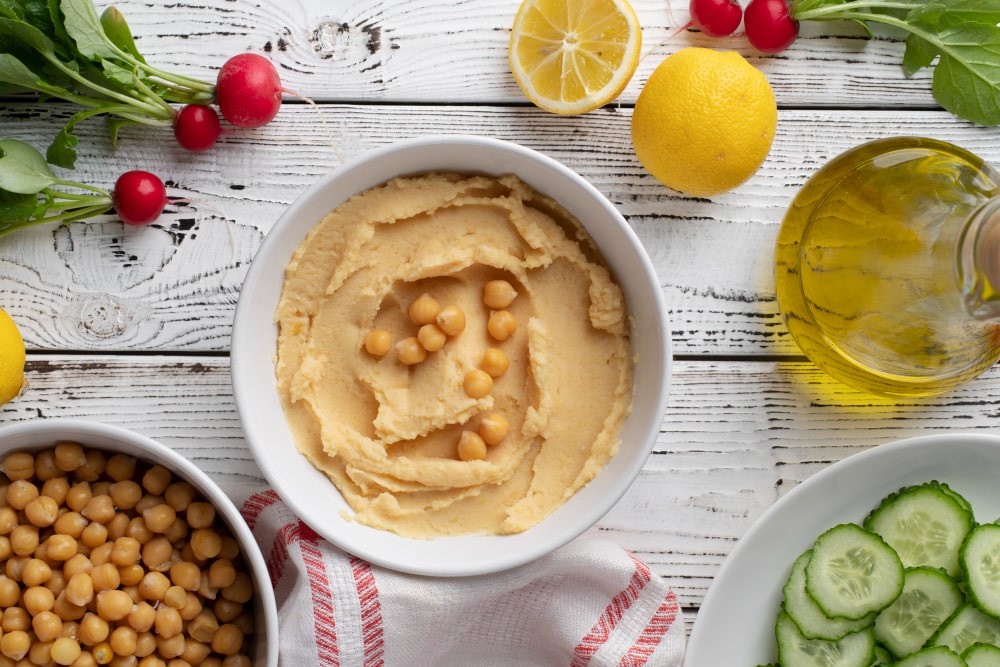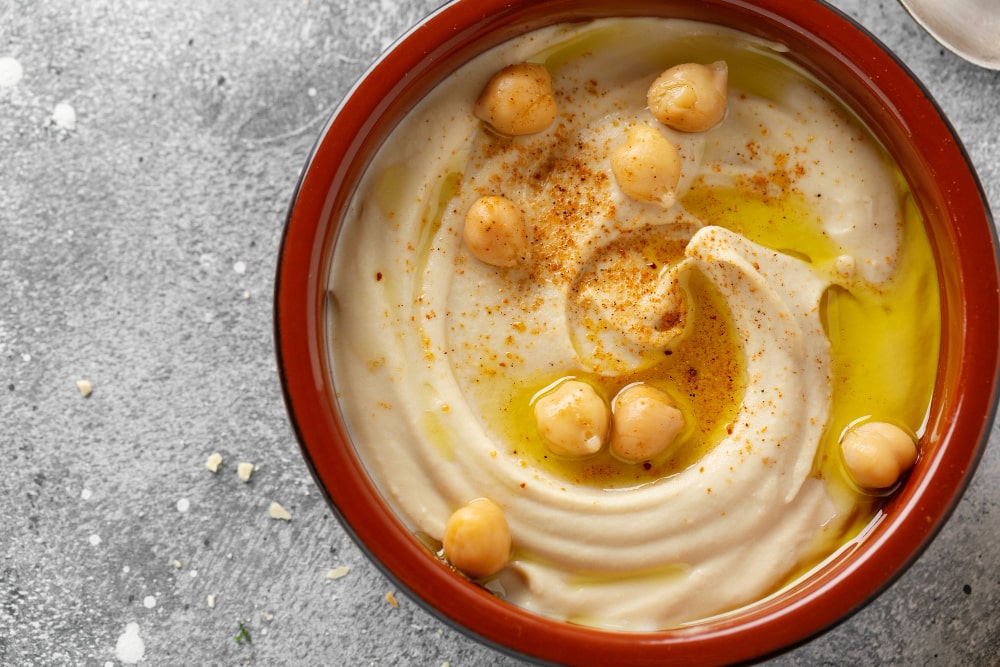Are you a soon-to-be mom looking for delicious and healthy snacks? Hummus is an excellent choice for expecting mothers, as it can provide numerous nutritional benefits during pregnancy. This guide will explore you can eat Hummus while pregnant, the potential risks and benefits of eating Hummus while pregnant, and how to safely incorporate this flavorful food into your diet.
Nutritional Value of Hummus
Hummus is a nutritious and healthy snack, rich in plant-based proteins, vitamins, minerals, and antioxidants. It usually consists mainly of chickpeas, tahini (sesame paste), olive oil, and lemon juice. Chickpeas are a good protein, fiber, folate, calcium, and iron source. Tahini is full of healthy fats, and olive oil is rich in antioxidants. Hummus delivers a range of essential nutrients for a healthy pregnancy.
| Nutrient | Amount Per Serving |
| Calories | 200 per ¼ cup (70 g) |
| Protein | 8 g |
| Fat | 12 g |
| Fiber | 4.5 g |
| Folate (Vitamin B9) | 40% of the RDI |
| Iron | 10% of the RDI |
| Calcium | 10% of the RDI |
Benefits of Eating Hummus While Pregnant
Eat Hummus while pregnant can provide many potential health benefits. Folate is an important nutrient for pregnant women, and Hummus is a great source. This B vitamin helps prevent congenital disabilities such as spina bifida and is important for the healthy development of the fetus. Hummus’s protein, fiber, and iron can help reduce fatigue and keep blood sugar levels stable throughout your pregnancy. In addition, the antioxidants in Hummus may help protect against cell damage caused by free radicals. Eating Hummus is also linked to a decreased risk of gestational diabetes and preeclampsia.

Read More: Sugar Free Cranberry Juice: Easy to Make at Home
Risks and Precautions
Although there are many benefits to eat Hummus while pregnant, there are also some potential risks. As with all food items, it is important to practice caution and moderation when consuming Hummus while pregnant. Bacteria from uncooked chickpeas can pose a risk of food poisoning, so make sure to cook them thoroughly before eating. Additionally, tahini contains high levels of oxalates, which may cause gallbladder and kidney problems in some individuals. As always, consult your healthcare provider before incorporating Hummus into your pregnancy diet.
Incorporating Hummus into Your Pregnancy Diet
Hummus can make a delicious addition to any expecting mother’s diet if eaten safely and in moderation. It is important to choose hummus varieties made with high-quality ingredients like fresh chickpeas, organic tahini, and extra virgin olive oil. Additionally, opt for store-bought varieties that contain preservatives in order to avoid food poisoning. Hummus can be enjoyed as a balanced meal or as a snack between meals.
Delicious Hummus Recipes for Expecting Mothers
There are many creative ways to enjoy Hummus while pregnant. Here are some delicious recipes to try:
- Hummus Pizza: Spread your favorite variety of Hummus on a pizza crust and top it with your choice of vegetables, herbs, or nuts.
- Hummus Tacos: Fill soft tortillas with mashed avocado, shredded lettuce, diced tomatoes, and a generous scoop of Hummus.
- Hummus and Veggie Wrap: Spread Hummus on a flour tortilla, layer with your choice of vegetables, roll up and enjoy!
- Hummus Fruit Dip: Combine a cup of Hummus with half a cup of plain yogurt and mix in your favorite fruits. Enjoy as a snack or dessert!
- Hummus Toast: Toast your favorite type of bread, spread Hummus over it, and top it with fresh herbs or avocado slices.
- Hummus Bowl: Create your custom hummus bowl by mixing cooked quinoa or brown rice with chopped vegetables, crumbled feta cheese, and a dollop of Hummus.
Read More: Top 11 Cucumber Juice Benefits: How to make Cucumber Juice?
Alternatives to Hummus
There are many nutrient-rich options if you are looking for alternatives to Hummus while pregnant. Some great choices include guacamole, bean dip, edamame, and tzatziki sauce. These snacks provide a range of nutritional benefits and can be enjoyed as part of healthy meals or snacks.
Staying Mindful of Portion Sizes
When enjoying Hummus while pregnant, it is important to practice mindful eating and be aware of portion sizes. As Hummus is high in calories, it should be enjoyed in moderation. Keep portions small and as part of a balanced meal or snack.

Listening to Your Body
It is essential to pay attention to your body’s signals when consuming any food during pregnancy. Listen carefully to your body and stop eating when you feel full.
Read More: Spicy Food While Pregnant: What You Need to Know?
Consulting Your Healthcare Provider
Before making any changes to your diet while pregnant, it is important to consult with a healthcare provider. They can offer personalized advice and guide you and your baby on the best foods.
Hummus: A Versatile and Flavorful Choice
Hummus is an excellent choice for expecting mothers, as it is a nutritious and flavorful snack. With its high protein, fiber, and essential vitamins and minerals, Hummus can provide numerous benefits to pregnant women.
Myths and Misconceptions
There are many myths and misconceptions surrounding the safety of eating Hummus while pregnant. It is important to remember that when eaten safely and in moderation, Hummus can be a nutritious and delicious addition to any expecting mother’s diet.
Conclusion
In conclusion, Hummus is a versatile and flavorful snack that can provide many health benefits to expecting mothers. However, it is important to ensure that the ingredients are high quality and cooked thoroughly before consuming. As always, consult with a healthcare provider before making any changes to your diet.
Read More: Turmeric Rice Recipe: Easy to Make It
FAQs
Yes, Hummus can be a nutritious and healthy snack for pregnant women. However, it is important to ensure that the ingredients are high quality and cooked thoroughly before consuming. Additionally, remember to practice mindful eating and pay attention to your body’s signals when enjoying Hummus during pregnancy. As always, consult with a healthcare provider before making any changes to your diet.
Yes, some people may experience an allergic reaction to Hummus. People with allergies to chickpeas, sesame seeds, or other ingredients used in Hummus should avoid consuming it. Additionally, those sensitive to oxalates should also be mindful when eating Hummus, as tahini contains high levels of oxalates. As always, consult a healthcare provider before introducing Hummus into your diet.
Regarding food safety, store-bought varieties are usually the safest choice as they contain preservatives to prevent food poisoning. However, if you choose to make your own Hummus, it is important to practice caution, use only high-quality, fresh ingredients, and cook them thoroughly. Additionally, be sure to follow proper storage guidelines in order to protect against food poisoning.
Hummus is a great source of folate, an essential nutrient for pregnant women. One serving of Hummus contains approximately 10% of the recommended daily value of folate. Additionally, Hummus also provides other important vitamins and minerals such as iron, phosphorus, and zinc. As always, talk to your healthcare provider about incorporating Hummus into your pregnancy diet.
Hummus can be frozen to extend its shelf-life. To freeze, store the Hummus in an airtight container and place it in the freezer for up to three months. When you are ready to enjoy your Hummus, thaw it overnight in the refrigerator or at room temperature. Be sure to check the expiration date before consuming.

